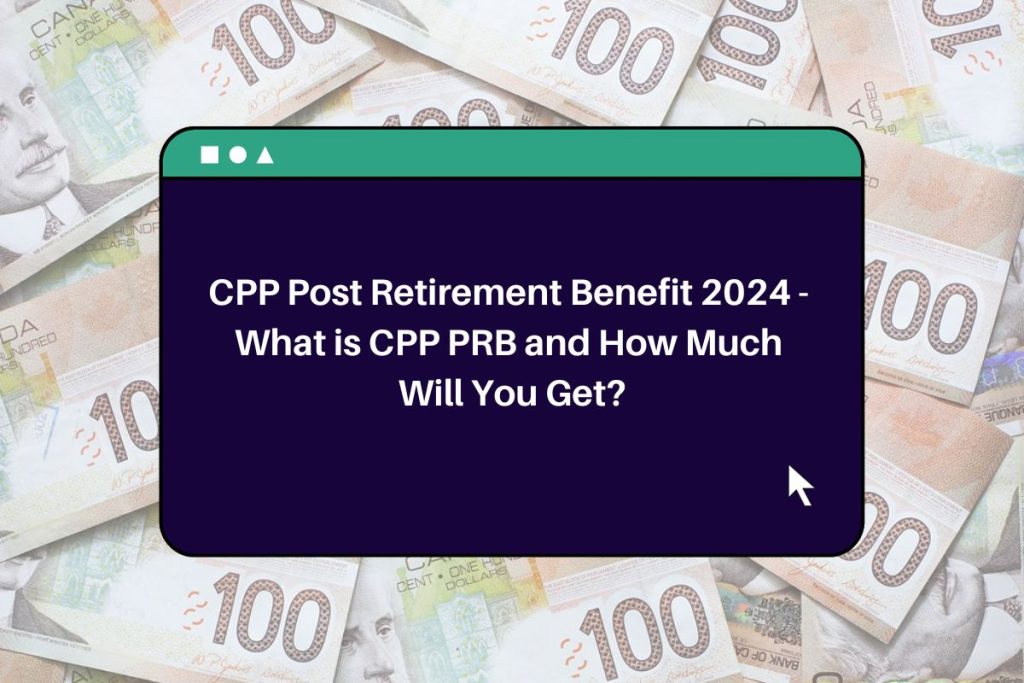Recipients of CPP benefits under 70 years of age are permitted to go on working and contributing to their pension. Your monthly CPP payments will be increased for the remainder of your life by the CPP post-retirement benefit (PRB), which is funded by your contributions. Prior to 2012, a person’s ability to contribute to the Canada Pension Plan ended the moment they began receiving CPP payments. But once the CPP post-retirement payments were implemented, this was changed.
An individual must be between the ages of 60 and 70, be receiving their CPP pension, be working and making contributions to CPP, and be eligible for CPP Post Retirement Benefit 2024 payments. Now check this page for What is Post Retirement Benefit? and How Much is CPP PRB?
What is CPP Post Retirement Benefit (CPP PRB)?
In recent years, the Canada Pension Plan (CPP) has undergone a number of significant modifications. One of these modifications, which became operative on January 1, 2012, concerns retirement benefit beneficiaries of the CPP or QPP who continue to work in Canada (except Quebec). These people are now able to contribute to the new Post-Retirement Benefit and in certain situations, they are required to.
Before the PRB was implemented, those who were receiving their CPP/QPP retirement benefit and then went back to work were no longer eligible to make contributions to the CPP program. An overview of the PRB and how it might influence your choice of when to start receiving your CPP retirement benefit is given in this article.
CPP Post Retirement Benefit 2024 Details
| Plan Name | CPP Post Retirement Benefit |
| Country | Canada |
| Benefit Amount | Read this article |
| Category | Government Aid |
| Official Website | canada.ca |
CPP Post Retirement Benefit Eligibility
- It is offered to anyone between the ages of 60 and 70 who are employed, making CPP contributions, and/or getting a retirement benefit from the CPP or the Quebec Pension Plan (QPP)
- Employer and employee are both required to contribute to CPP. Self-employed people are required to pay both the employer and employee of the CPP payments.

Post Retirement Benefit in Detail
As part of the several modifications made to the CPP program to reflect Canadians’ evolving lifestyles, many of whom are opting to work longer and have longer, healthier lives the PRB was created. A new lifelong benefit that is distinct from the regular CPP retirement payments is the PRB.
A separate benefit will be generated from your payments to the PRB, and it will be payable as early as January 1st of the year after the year you make the contributions. For instance, the benefit might be distributed as early as 2013 if PRB payments are made in 2012. In spite of obtaining the maximum CPP/QPP retirement income, this enables CPP/QPP claimants to receive additional retirement benefits.
How Much is CPP PRB?
The amount that an individual earned and contributed in the year prior, as well as their age on the first day of the year that their PRB starts, determine the CPP Post Retirement Benefit Amount 2024. Every year a worker receiving CPP benefits contributes to their CPP, a new PRB is created and added to the total amount of income the worker receives from the CPP.
This implies that a single individual may be eligible to get many PRBs concurrently. Your age, income level, and the total amount of contributions you made the year prior will all affect how much PRB you receive. Your PRB will be impacted by your age, much as the CPP. For instance, a 68-year-old who makes the same PRB contribution as a 62-year-old will get a larger PRB sum than the 62-year-old.
Before adjustment, the Maximum PRB Payment 2024 for a single year is around 1/40th of the maximum annual CPP retirement benefit. An individual’s pensionable earnings for the year, the year’s YMPE, the MPEA for the subsequent year, and the actuarial adjustment factor are used to determine the PRB.
Who has to contribute?
Beginning on January 1, 2012, in the event that a person is receiving their CPP/QPP retirement pension and earns money in Canada (apart from Quebec):
- Employees and their employers will be required to pay mandatory CPP contributions if they are 60 to 64 years old. Those who work for themselves must pay the employer and employee parts.
- Employees who are at least 65 but under 70 years old have the option to elect not to make CPP contributions, which will result in a PRB, or to make CPP contributions and get a PRB instead. Employers are required to contribute in matching amounts if employees decide to make the contributions. If self-employed people decide to make a contribution, they will be responsible for paying both the employer and employee shares.
- Contributions stop when an individual either stops working or reaches age 70.
| Our Homepage | Matricbseb.com |
- About the Author
- My Recent Posts
